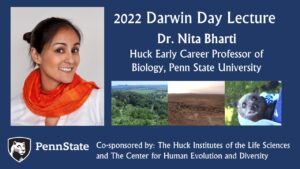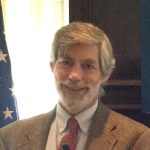 2022 Darwin Day Lecture featuring Nita Bharti
2022 Darwin Day Lecture featuring Nita Bharti
Adaptation for Survival: Humans and Their Pathogens
Pathogens play a significant role in shaping human biology and behavior, which in turn shape pathogen evolution. Adaptation is constant, whether from humans changing their behavior or pathogens gaining fitness advantages. Understanding human-pathogen interactions in the environmental and cultural contexts in which they occur is a global health priority. From remote settlements to well-connected urban areas, these feedback loops underlie transmission dynamics. Our knowledge of these patterns determines our capacity to manage endemic and emerging pathogens. Combining new and old technologies to measure these interactions provides insight for updating pathogen control efforts. I will discuss how local context can help identify and integrate unconventional types of data on humans, pathogens, and environments to help prevent diseases that threaten humans, like measles and Hendra virus, in the populations where they most urgently need to be addressed.












